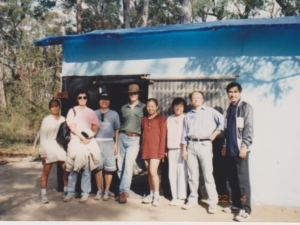
Cross Over to the Other Side
For Christians, the word ‘cross’ symbolises the centrepiece of our faith. However, it is also a verb which denotes an action, a definite and deliberate

Luis Mostacero is originally from Peru. He served on board the OM Ship Logos 2 for two years, where he met his French wife Anne-Laure. They have two teenagers, who were born in Spain, where Luis and Anne-Laure served as missionaries helping with church planting in Murcia. He was the General Coordinator of GLO Peru, where they also served helping in the development of a Bible Institute. He also worked as general coordinator of SEMIPE, the Peruvian missionary service. At the moment, he is studying at Trinity Evangelical Divinity School in Deerfield, Illinois.
In 1536, the Franciscans inaugurated the Colegio Santa Cruz in Tlatelolco, Mexico, with the purpose of training Mexican people for eventual ordination in the Roman Catholic priesthood. This project soon failed, and even in 1585 bishops from new Spain forbade the ordination of Mexicans to the priesthood. The programmes for the Catholic elite served only Europeans, thus creating a divide which lasted for centuries between the Catholic church, overseen by a completely European clergy, and the local people it sought to reach. This historical incident caught my attention and made me ponder the way we tackle the subject of training leaders in the mission field.
Dependency?
We are concerned about developing countries not becoming financially dependent on the West, but do we have the same concern about these countries becoming biblically dependent? Are we strengthening this dependency if we do not train the leaders with teaching and biblical interpretation tools? For instance, about 80 per cent of Christian books in Spanish are translations from English. As a Latin American believer, I have realized how much my people are years behind in producing our own Bible commentaries that can be useful for the church in general.
For more than a century, we have received many missionaries who have contributed greatly in the formation of many assemblies in Latin America and there have been many attempts to train a new generation of leaders. However, there is still a long way to go before we can see national teachers in the quantity we see in the Western countries, where there are Bible colleges and professors who hold masters and doctorates in their theological studies.
This dependency can occur within Western countries towards those in developing countries who have few opportunities. But this can also happen from bigger cities within developing countries with superior educational opportunities towards the smaller village churches in more remote parts with fewer prospects.
Teaching shapes the mindset of the believer and changes how we live
Luis Mostacero, Mission Worker Tweet
The Great Commission
The Great Commission as expressed in the gospel of Matthew contains an important yet often underappreciated element: teaching. It concludes, “teaching them to obey everything I have commanded you” (Matt. 28:20). Teaching is not merely a transmission of information. It challenges the whole personhood of man and woman: head, heart and hands. It is striving to ‘take captive every thought to make it obedient to Christ’ (2 Cor. 10:5).
When we go as mission workers, one of the most important tasks is teaching. If you think about it, most missionary work involves teaching, whatever the context, whether formally or informally, children or adults. Even in social programmes, we are teaching through modelling with our lives. Teaching shapes the mindset of the believer and changes how we live, how we do church and ministry.
Learn from the Lord Jesus
In order to teach the things that Jesus taught us, we need to learn from the Lord himself. He spent time with his disciples; he did not just pass on a systematic theology textbook. Jesus taught with his life, modelling a life of love, sacrifice and holiness. He used direct commands, challenging applications, lively illustrations and engaging parables, but not merely to entertain people. He made them reflect with sharp questions and made them think through what they would do in similar circumstances. One of the purposes of questions is to develop people’s ability to think critically. Would we like our children go to school and just memorise facts as robots? For the teacher, it would certainly be easier; however, Jesus took the time to create parables, formulate insightful questions and then base his practical commandments in their own discoveries: ‘go and do likewise’ (Luke 10:37).
Paul´s missionary ministry involved teaching. He taught in churches, like in Antioch for a period of a year (Acts 11:25-26). He taught in synagogues like in Ephesus (Acts 19:8). When they refused to believe, ‘He took the disciples with him and had discussions daily in the lecture hall of Tyrannus. This went on for two years, so that all the Jews and Greeks who lived in the province of Asia heard the word of the Lord.’ (Acts 19:9-10). Even while in prison in Rome: ‘he proclaimed the kingdom of God and taught about the Lord Jesus Christ – with all boldness and without hindrance!’ (Acts 28:31).
Teaching on the mission field
Often, some Christians with a burden for mission go to the mission field and spend a couple of weeks teaching. It is good, but is it enough? Are we making ourselves indispensable? How can we avoid biblical knowledge dependency? Teaching is key, but we need to teach people in such a way that they can then effectively teach others. The apostle Paul shows his concern for the training of future generations when he writes: ‘And these things you have heard me say in the presence of many witnesses entrust to reliable people who will also be qualified to teach others.’ (2 Tim. 2:2). If we go on short mission teams to teach national believers, we need also to think how to help the Bible teachers to get the biblical and pedagogical resources (like study books, particularly books written by and for them, courses on biblical interpretation, workshops on learning how to teach, etc.) to continue the work after we leave.
Teaching in the mission field needs to have an element of helping national people learn how to become critical thinkers, just as we see Jesus challenging with his parables. If we do not teach people critical thinking and discernment, there will be at least two consequences. First, without the ability to reflect for themselves, they will be easily led astray by false doctrines. Several assemblies in rural areas in Latin America have been misled and ended up following the prosperity gospel and a misuse of the spiritual gifts. Second, leaders that do not learn orthodox doctrine in this way will be intolerant with other perspectives within the local church. In some congregations, if you think differently, even in secondary issues, you are considered rebellious to the elders of the local church.
I believe we need to reevaluate how we teach God’s Word in the mission field and in our churches. Teaching the teachers must start even with those who work with children. May God help us to imitate the Lord Jesus and the great missionaries of the Christian educational tradition, such as Paul, who invested their lives in teaching through their exemplary lives, praying for growth in spiritual knowledge and the application of God’s Word in the disciples’ lives.

For Christians, the word ‘cross’ symbolises the centrepiece of our faith. However, it is also a verb which denotes an action, a definite and deliberate

“Why not try to paint a picture based on your favourite hymn?” There are many hymns I love, so it’s always hard to choose a

I was raised in a Christian family and was 12 when the Lord called my parents to missionary service. Seeing other countries and cultures was

“You’re not Irish!” he said with a derogatory smile on his face. I was confused, because I thought I was. Some might quip that it

What playlist have you planned to use this summer and what’s it called? Nowadays many of us use playlists on our phones or tablets to

Some words can provoke a reaction. I have sometimes spiced up a conversation with friends by dropping in a word that I know will be

What do you think is the greatest challenge for missionaries? Apparently it’s not necessarily the uncomfortable climate, the unfamiliar diet, the difficulties of language, the

Interesting times we live in! Even if you were alive for the last global pandemic, none of us have experienced anything like this before. The

In this blog, let us think about how our strategies in mission compare with the early church in Acts. Here are two passages from Acts which

Standing one evening with my grandson, who was three years old at the time, we were gazing into the dark night sky. Trying to be

God’s call to us was progressive, slow and measured. Probably, in my case, it started when I was born to missionary parents who came from

Coronavirus: the word on everyone’s lips and the fear in (almost) everyone’s hearts. Response to the pandemic has been mixed. We cannot fail to be

With every job description comes information about the task at hand: what have I to do? Who do I report to? What resources are available

What does it mean to waste life? This is a burning question that all human beings need to face as individuals. Many are wasting the

Being a missionary is not an occupation that many young people would consider these days. When I started as a missionary, there was no salary,

It was toward the end of 1989 when the Lord stopped me in my tracks. For years I had heard the gospel through a Christian

In Acts 8:26-35, we eavesdrop as Philip shares the Message of Jesus with a fellow-traveller. 1) Listening to God (8:26, 29) Philip was a person open

In my first blog I mentioned how important Christian camps have been to us as a family and especially to our two boys Josiah and Joseph.

What should our strategy for mission be?That’s a question many books and articles seek to grapple with. But whilst a lot of these strategies are

These were the remarkable words that Jesus said to his disciples. They’d seen that the crowd who were there to listen to Jesus were in
If you would like to receive information about our next events feel free to sign up to our mailing list.
© Copyright 2019 GLO Europe. All Rights Reserved | GLO-Europe is a charitable Trust based at 78 Muir Street, Motherwell, ML1 1BN.